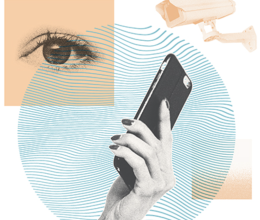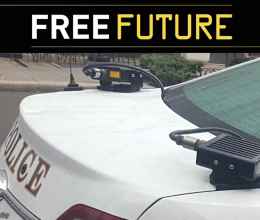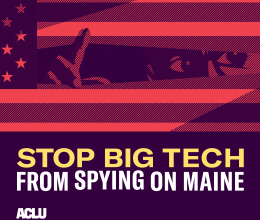Remember the song "Walk Like An Egyptian" by the Bangles? It topped the chart for four weeks back in 1986. That's the last time our nation's electronic privacy laws were updated when the Electronic Communications Privacy Act was signed into law by then President Ronald Reagan. In 1986, the cell phones that were available were far too small to fit in one's pocket. Perhaps no one envisioned then that the cell phone itself and other electronic devices would become essentially miniature tracking units that most of us carry around with us everywhere we go.
The ACLU is working nationwide to change our laws to reflect the extraordinary new surveillance capabilities of emerging technologies. Last week, the ACLU of Maine testified in support of a bill, LD 415, that would put in place warrant requirements for the use of cell phone tracking by law enforcement. Seems simple right? After all, the Fourth Amendment to the Constitution states plainly:
"The right of the people to be secure in their persons, houses, papers, and effects, against unreasonable searches and seizures, shall not be violated, and no Warrants shall issue, but upon probable cause, supported by Oath or affirmation, and particularly describing the place to be searched, and the persons or things to be seized."
The United States Supreme Court ruled in the case of United States v. Jones (2012) that law enforcement need a warrant to place a GPS tracking device on one's vehicle. So what about the GPS tracking device in your pocket? Law enforcement and the Maine Attorney General's office think a warrant is not necessary; they testified last week in opposition to the bill.
It's not surprising that law enforcement want to be able to engage in cell phone tracking without having to go before a judge to obtain a warrant. As a technology expert testified to the Maine legislature's Judiciary Committee last week, the information that law enforcement can obtain from the cell phone companies about an individual's real-time or historic movements is extraordinarily precise. As a New York Times article last summer noted, "That's Not My Phone, It's My Tracker." Your cell phone -- smart or not -- pings on the nearest cell towers every seven seconds. Law enforcement can compile a map of your longitudinal and latitudinal coordinates that identifies everywhere you go in a day from the doctor's office to church to the home of a friend or to the peace rally. Cell phone tracking technology allows for remote shadowing of almost anyone all from the comfort of a police station.
The Maine State Legislature has a choice. They can pass LD 415 and put in place warrant requirements for cell phone tracking. Or they can defer to law enforcement and an outdated law that passed when "Walk Like an Egyptian" was new. You can help your legislators make the right decision by contacting them today and urging support of LD 415.
Walk Like An Egyptian and Other Relics of 1986
Related Issues
Related content

Know Your Rights: Electronic Device Searches During Travel
September 3, 2025
I’m Hearing About More Pushback Against Flock, Fueled by Concern...
August 19, 2025
Flock’s Aggressive Expansions Go Far Beyond Simple Driver Surveillance
August 16, 2025
Surveillance Company Flock Now Using AI to Report Us to Police if...
August 7, 2025
AI Could Exacerbate Inequality, Experts Warn
July 23, 2025
As AI Gains Power, We Must Push for Guardrails to Protect Civil...
July 2, 2025
Weekly Highlights June 23 - 27
June 28, 2025
Weekly Highlights May 5 - 9
May 9, 2025

